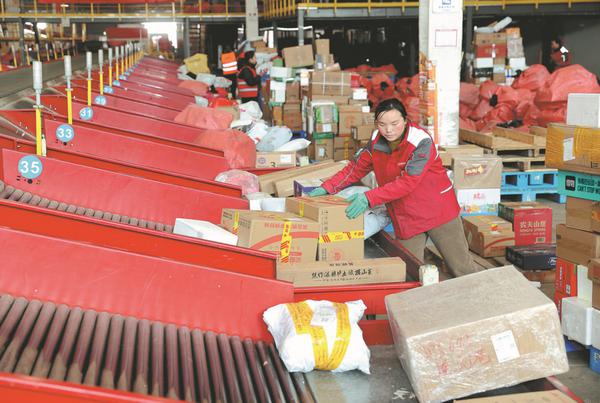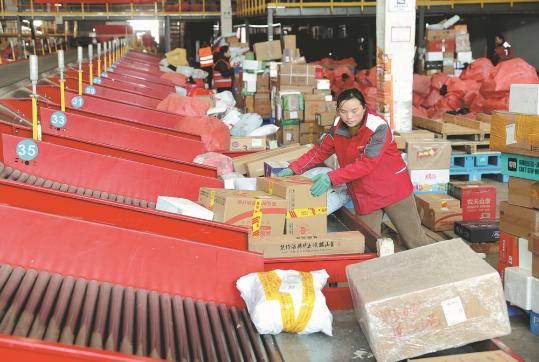China's parcel delivery on record high

Couriers sort parcels inside a logistics park in Suqian, Jiangsu province, on Wednesday. (Photo by Wang Li/For China Daily)
China's parcel delivery industry shattered all previous records in 2024, handling a staggering 174.5 billion packages — equivalent to more than 124 per person in the country. The rapid expansion of the sector underscores not only the growing dependence of Chinese consumers on e-commerce, but also the increasing role express delivery plays as a barometer of the economy.
This explosive growth comes as no surprise. The total volume of express delivery services last year reached 174.5 billion parcels, marking a 21 percent increase over the previous year. Meanwhile, business income from these services surged to 1.4 trillion yuan ($191 billion), reflecting a 13 percent growth.
"The postal and express delivery industry has become a driving force in China's logistics sector, and for 11 straight years, it has ranked first globally in delivery volume," said Zhao Chongjiu, head of the State Post Bureau of China, at the bureau's annual conference on Wednesday in Beijing.
"The integration of express delivery into daily life has been profound. It now serves as a vital indicator of both economic vitality and development," he added.
As more parcels move through the country's vast logistics network, it is clear that express delivery is no longer just about transporting packages from point A to point B — it has become a powerful symbol of China's thriving economy.
Across the nation, particularly in the central and western regions, delivery networks have been rapidly expanding. In 2024, express delivery volumes in these regions grew by 30 percent and 35 percent, respectively, compared to the previous year. This expansion has significantly helped bridge the development gap between urban and rural areas.
Subsidized shipping policies to remote villages, such as those in the Xinjiang Uygur and Inner Mongolia autonomous regions, have brought e-commerce services to areas that once struggled with limited access to goods and services.
This growth has also unlocked new economic opportunities, enabling businesses in emerging sectors such as livestreaming e-commerce and cross-border trade to thrive. Online retail sales of physical goods soared last year, and the delivery industry played a crucial role in facilitating these transactions. This makes it an essential partner in the ongoing digital transformation of the economy.
The result of this booming logistics network is felt in every corner of the country — transforming not only how businesses operate, but also how ordinary people live.
One striking example is the story of Zilati, a young man from the Tajik ethnic group who married last year in a remote village in Tashikurgan Tajik autonomous county, Xinjiang.
As he prepared for his wedding, Zilati was able to purchase nearly everything online — from decorations to large appliances such as a refrigerator — and have it delivered directly to his home. In the past, such a task would have required a long and arduous journey to Kashgar, the nearest big city. Thanks to the expanding logistics network, he was able to concentrate on enjoying his special day.
"I never imagined that my wedding could be this easy," Zilati said. "It's so convenient. I bought the wedding chocolates and decorations online. In the past, we had to travel to Kashgar, which took more than 10 hours. Now, thanks to online shopping, I was able to focus on celebrating my wedding rather than worrying about logistics."
In 2024, the average Chinese consumer received over 120 parcels annually, with the country's delivery network processing more than 5,500 every second.
Looking ahead, the industry is showing no signs of slowing down. In 2025, express delivery volume is projected to reach 190 billion, with corresponding revenue of 1.5 trillion yuan.
"The key growth drivers for the express delivery industry in 2025 will mainly come from the domestic e-commerce market, which continues to grow rapidly, especially with emerging e-commerce platforms like Douyin and Kuaishou driving market expansion. Internationally, cross-border e-commerce will be a major driver, with express delivery companies accelerating their global expansion, contributing to the growth of national delivery services," said Zhou Zhicheng, director of the Research Office of China Federation of Logistics and Purchasing.
As China's express delivery sector continues to expand, it is clear that the logistics industry is not only driving economic growth, but is also becoming an integral part of everyday life for millions.

